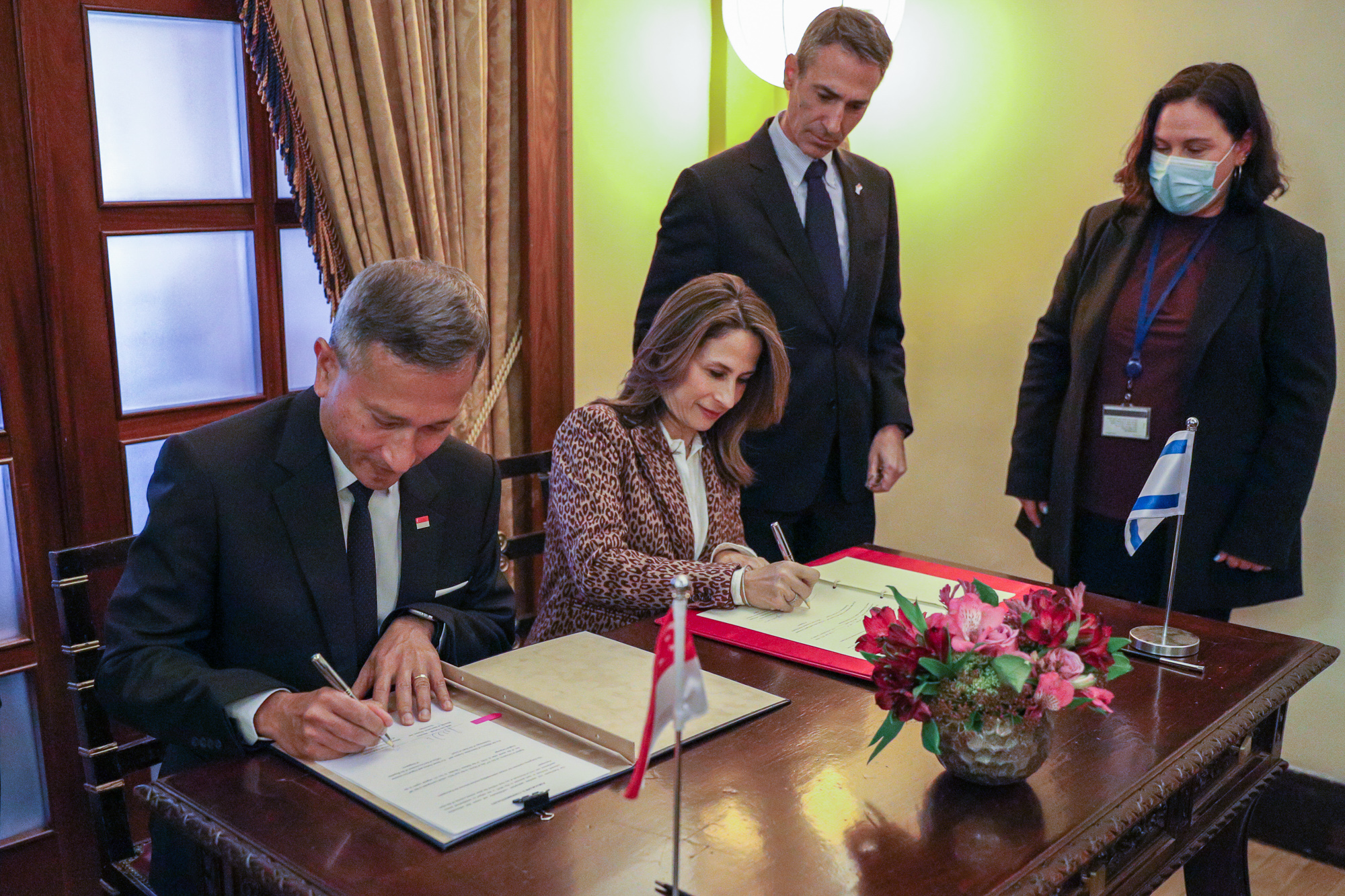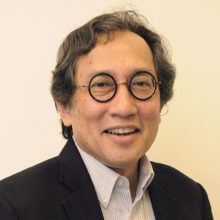
- 15 Jun 2022
Innovation and Collaboration. 25th anniversary of the Singapore-Israel Industrial Research and Development Foundation
(This event is organised by MEI Political Economy research cluster.)
2022 marks the 25th anniversary of the Singapore-Israel Industrial Research and Development Foundation which has funded about 190 projects since its inception. The active collaboration between the two innovative countries has continued to strengthen over the past five decades. Earlier in March, Israel and Singapore signed a Memorandum of Understanding on cross-border cooperation on artificial intelligence. Singapore will also be establishing its embassy in Tel Aviv this year.
This webinar was organised by the Middle East Institute (NUS) to commemorate these significant events and the collaboration between both countries.
This public talk was conducted online via Zoom on Wednesday, 15 June 2022, from 4.00 pm to 5.30 pm (SGT).
Photo caption: Singapore Minister for Foreign Affairs Dr Vivian Balakrishnan signs an MOU on AI cooperation with Israel Minister of Innovation, Science and Technology Orit Farkash-Hacohen (Photo Credit: Ministry of Foreign Affairs, Singapore)
Listen to the full event here:
Watch the full event here:
Read the Summary of Event Proceedings:
By Daniel Kalish
Intern, Middle East Institute, National University of Singapore
For Roy Zur, an Israeli cybersecurity expert and entrepreneur whose businesses have partnered with a number of Singapore organisations, Israel and Singapore are natural partners. While the former has a risk-taking and results-driven focus, the latter’s strengths are its methodological, process-oriented qualities, he noted at a forum marking both countries’ cooperation on innovation. This means the partnership forms a whole that is greater than the sum of its parts. “What we are celebrating is not the differences, not the similarities, but the complementarities,” Mr Zur said.
The panel discussion, titled “Innovation and Collaboration. 25th anniversary of the Singapore-Israel Industrial Research and Development Foundation”, was organised and hosted by the Middle East Institute. It discussed the Singapore-Israel Industrial Research and Development Foundation’s progress and its successes in funding over 190 projects to date, as well as broader collaboration between the two countries. Mr Zur was joined on the panel with Bilahari Kausikan, Chairman of the Middle East Institute, and Ambassador Sagi Karni, the Israeli ambassador to Singapore. The forum was moderated by Edmund Lim, an executive director of University Partnerships – APAC for ThriveDX.
Mr Zur, whose career spans the military and private sectors, has founded several cyber-focused companies, including Cybint, a cyber education company that reskills and upskills individuals for the cybersecurity field. During his service in the Israeli Defence Forces (IDF)’s intelligence collecting and code decrypting Unit 8200, one of his primary responsibilities was to teach enlistees cyber intelligence and cybersecurity skills in just three to six months, which gave him the idea to replicate this model in the private sector, inspiring Cybint. He has since collaborated with Singapore on several projects, having first been invited to the country to attend a conference by the NTUC Learning Hub, an organisation which helps develop the skills of working professionals. That first visit made quite the impression on him – recalling it, he said he saw first-hand “the hunger for knowledge” and “love for education” among Singaporeans. Since then, his collaboration with NTUC has trained more than 10,000 people to enter or climb up the ladder in the cybersecurity and cyber intelligence industries in Singapore.
Such collaborations, Mr Kausikan said in his opening remarks at the forum, were part of the “special relationship” that exists between Israel and Singapore, which began when the IDF helped develop the Singaporean military in its early years. The early partnership, he added, has since grown to include joint efforts in many other areas.
In his remarks, Ambassador Karni also drew parallels between Singapore and Israel. Both countries, he said, have no natural resources, and are thus forced to make their own way in the world through human ingenuity. Asked about the secret to Israel’s success in innovation, Mr Karni said the willingness to take risks, and to challenge authority – what he called “chutzpah” – were key. These attributes have led to the creation of 49 unicorns – start-ups valued at more than a billion dollars – in Israel, which is more than in all of Europe.
The question-and-answer session that followed the talk covered several topics, including how to attract and retain talent. Mr Karni, who spoke about the Israeli foreign service’s approach, said creating a sense of purpose, and being paid well, are important. “People need to feel importance in what they do”, he noted. Mr Kausikan agreed, and said that while Singapore’s foreign service does not have an issue with compensation, “the challenge is to create a workplace that enhances a sense of purpose” which starts with building trust between senior and junior officers.
Mr Zur, who spoke on attracting talent from the cyber security industry perspective, said that there should be a push to “demystify” the technology and innovation sectors, as “talent can come from the most unexpected places”. He noted that there are four million unfilled jobs worldwide in the cyber security sector, and that the industry can learn from Unit 8200, which took students right out of high school and trained them in a short time, rather than the “formal” approach of waiting four or more years for students to attend university and do research before entering the industry.
In response to a question on the possibility of US-China decoupling, Mr Kausikan said it was very unlikely that the two systems would bifurcate completely, given the “complexity, scale and scope” of the supply chains which connect them. He also noted that the competition within a single system is complicated for Singapore, but creates more possibilities and agency as well.
Ambassador Karni agreed that a full technological decoupling was unlikely, as neither superpower had in interest in it, but noted that his experience working in China taught him not to underestimate the Chinese people or their ability to progress.
Another question that arose related to Mr Zur’s observation that the IDF was a breeding ground for entrepreneurs. How could Singapore, which also has conscription, replicate this, an audience member asked. In his reply, Mr Zur said the culture within Unit 8200 was that failure was not punished. The practice of learning from mistakes, he said, was important in developing entrepreneurs.
In closing, he added that he makes mistakes all the time. Several times a week, he said, he thinks to himself that “I was wrong about this, that was a bad choice – let’s learn from it and let’s change it”.
About the Speakers

Chairman
Middle East Institute, National University of Singapore
Mr Roy Zur
CEO
ThriveDX SaaS
Ambassador Sagi Karni
Ambassador of Israel to Singapore
[Moderator] Mr Edmund Lim
Executive Director
University Partnerships-APAC
ThriveDX
Mr Bilahari Kausikan is Chairman of the Middle East Institute (NUS). He has spent his entire career in the Ministry of Foreign Affairs. During his 37 years in the ministry, he served in a variety of appointments at home and abroad, including as ambassador to the Russian Federation, permanent representative to the United Nations in New York and as the permanent secretary to the ministry. Mr Kausikan studied at the Raffles Institution, the University of Singapore and Columbia University in New York.

Mr Roy Zur is a cyber intelligence expert, the founder and CEO of several cyber companies, including Cybint, a cyber education company. Cybint has been recently acquired by ThriveDX in the summer of 2021. Mr Zur has more than 15 years of experience in cybersecurity and intelligence operations from the Israeli defence forces, Unit 8200 (retired major) and has developed cyber education programmes and technological solutions for companies, educational institutions and government agencies around the world. As a former cyber intelligence major, he was responsible for developing learning methodologies and training around cybersecurity for people with no former experience.
Prior to his current position, Mr Zur has received law and business degrees and served as a legal adviser in the Israeli supreme court. In addition, he is a practicing attorney, and the chairman of the Israeli legislation research centre (OMEK Institute), which includes 150 researchers, who work with the Israeli parliament.
Cybint has an unwavering commitment to reskill the workforce and upskill the industry in cybersecurity. The company is tackling two of the biggest problems in cybersecurity: the talent shortage and the skills gap. Mr Zur has dedicated his career to cyber skills training for all age groups.
The company has been partnering with higher education and training facilities and has conducted training sessions for top organisations like JP Morgan Chase, United States Department of Justice, FINRA and Bank of America.
It was also awarded for Best Adult Learning Solutions at EdVentures GBA and placed in the top 10 for overall education solutions at the ASU + GSV Summit in 2020.

Ambassador Sagi Karni joined the Israeli foreign service in 1995. His first overseas posting had him stationed in Beijing. He then served as the deputy chief of mission in Oslo. Following which, he was a member of the Israeli delegation to the European Union in Brussels.
In 2008, Mr Karni began his tenure as ambassador to Angola and non-resident ambassador to Mozambique and Sao Tome. Upon completion, he returned to Israel to serve as the foreign affairs advisor to the minister of energy and water resources.
In 2013, he assumed the position of consul general to Hong Kong and Macau and returned to Israel after four years there.
While in Israel, Mr Karni headed the strategic planning and assessment unit and went on to become the acting head of the policy planning bureau of the Israel ministry of foreign affairs.
Ambassador Sagi Karni graduated with a Bachelor of Science (biology and philosophy) from the Hebrew University of Jerusalem and obtained a Masters Degree in public policy from the Tel Aviv University.

[Moderator] Mr Edmund Lim is the executive director of University Partnerships – APAC for ThriveDX, a global cyber education company. He was previously a senior vice president, involved in the establishment and management of international schools in Asia. He has also provided consultancy for EdTech companies, overseas ministries of education and organisations such as the World Bank.
Mr Lim has experience as a group academic director of international school campuses in Thailand and an education director in one of the world’s largest aquariums. He has also been a former principal and vice principal of primary and secondary schools in Singapore. Mr Lim researched and wrote on the Jewish community in Singapore when he was a teaching fellow at the National Institute of Education (Singapore).




